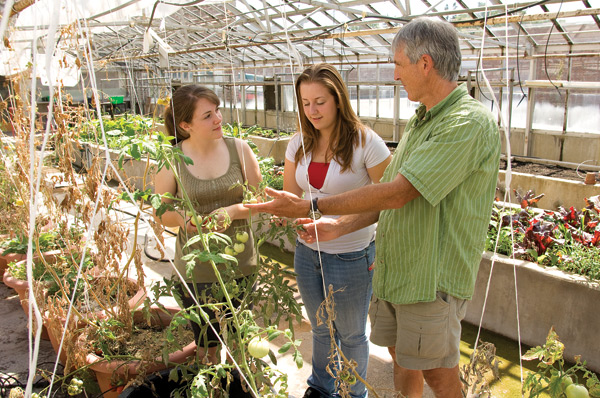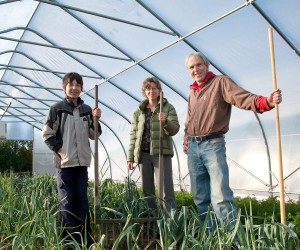Am Braigh Farm: Farming on the Back Side of the Calendar
Jamie bought Am Braigh’s three acres and broken-down old farmhouse in 1992. His aunt came up with the name, which is Gaelic for “higher ground,” relating both to his property and his spiritual leanings.

The movable hoop houses travel along metal tracks so various crops can be covered exactly when they need protection. Photo by Rosemary Hasner.
Imagine farming in Headwaters with no weeds, few pests and little need to water. Sound impossible? Then you haven’t grown spinach, turnips, salad greens, radishes, leeks, carrots, bok choy, tatsoi and a handful of other hardy vegetables in January and February. Yup, winter gardening has arrived in Headwaters, and it’s not what you’d think. At Am Braigh Farm near Mono Mills, Jamie Richards doesn’t fill expensive glass greenhouses with heat-loving vegetables and then bathe them in propane heat, nor does he risk frostbite when tending to his crops.
In his simple, moveable, metal-framed hoop houses built with two sheets of plastic that encase an insulating layer of air, Richards protects his hardy crops from wind, cold and the destructive cycle of freezing and thawing in much the same way as we don layers of clothing to keep ourselves warm on a wintery day.
The idea of a vegetable harvest in February may sound like the wildest fantasy of a Headwaters locavore, but that is exactly what Richards will do this winter. He is a disciple of Eliot Coleman who pioneered the four-season harvest in North America after noting that his farm in Maine is on the same north/south axis as places such as Florence, Italy and Bordeaux, France. Am Braigh is similarly situated on the 44th parallel, so it receives as much solar radiation as those more temperate climes.
Fresh vegetables are harvested all winter long at Am Braigh Farm
Richards reasoned if he could protect his crops from the worst of the cold and wind, he should also be able to grow vegetables all winter long. And he has discovered other benefits to gardening when the nights are long. The low temperatures result in less evaporation, so watering is reduced. And the cool air and low sun likewise discourage weed growth. Headwaters’ winter-gardening pioneer says, “The only pest that can be a problem is the meadow vole. As both a vegetarian and a prolific eater, it can create a bit of havoc in the greenhouse.”
With his two moveable and one stationary hoop houses and some row covers, Richards is farming on the “back side of the calendar.” It is not, however, a straightforward undertaking.
“The number of variables that you have to juggle is incredible,” he says. “When to plant, what to plant, when to cover … The hardest thing about growing vegetables year-round is following the sun. If I plant one day after the summer solstice, it results in a three-day delay in harvesting as compared to planting two days earlier. If I plant arugula in the summer, it’s ready in 28 days. If I plant it in late September, it takes twice that long.”
The hoop houses that make Richards’ winter gardening possible each travel the equivalent of their full length along metal tracks, allowing him to provide protection to twice as many plants exactly when they need it. While many of his winter crops can tolerate sub-zero weather, they do get an occasional blast of heat when the interior temperature drops to 0°c.
The only harvesting gap he foresees is in January when it’s especially cold and there is very little light. But that will be his chance for a bit of a break. His wife Nancy Ernst pipes in, “Even a farmer needs to lie fallow for a month.”
Richards describes the challenge of four-season growing as the most difficult thing he has ever done. But he seems more than up to the task and plans to expand the business in preparation for his retirement from teaching at Orangeville District Secondary School. He’s been on staff there since arriving from Stratford in 1985, teaching geography, history and, more recently, the greenhouse program in which his students learn about food cultivation. (See the autumn 2008 issue of In The Hills.)
Although he grew up in an urban environment, Richards discovered his passion early. He begged his dad for a backyard garden and has tilled soil ever since. He bought Am Braigh’s three acres and broken-down old farmhouse in 1992. His aunt came up with the name, which is Gaelic for “higher ground,” relating both to his property and his spiritual leanings.
The place has brought him good luck. When he advertised for a boarder, Nancy Ernst, newly arrived in Orangeville, answered the ad. The pair soon became more than landlord and tenant. They married in 1999 and their son Aidan arrived a year later. Ernst is now principal at the Headwater Hills Montessori School and helps out on the farm. “I love weeding,” she says.
Richards currently sells about 90 per cent of his summer and fall produce from a small retail store at the end of his driveway. He built the self-serve store when his portable stand could no longer accommodate the demand.
The little store has several display coolers containing recently harvested vegetables, eggs and homemade soups. Squash, garlic, onions and other late-season crops overflow the counters, and there are loaves of fresh-baked bread, local honey and Hockley Valley Coffee.
Next year Richards will increase his half-acre of vegetables – some 40 varieties in all – by 50 per cent to keep up with demand. “This year has been really tough because the business grew fast. I planned for a 40-per-cent increase and it’s been well beyond that.”
That growth is a testament not only to the quality of Am Braigh’s produce, but to the pent-up demand for a supermarket alternative from local customers, many of whom are really local. Ernst says, “It’s not the 100-Mile Diet, it’s the three-kilometre one.”
It takes Leigh Geraghty, one of Richards’ long-time customers, 15 minutes to walk to Am Braigh. Once there, she catches up with her neighbours who also buy Richards’ produce: “We get really excited by being able to buy local vegetables on a cold winter day.”
More Info
Am Braigh Farm · Proprietor Jamie Richards · 519.941.9089 · ambraighfarm.com
873393 5th Line Mono, just north of 5 Sideroad
- Self-serve stand at the end of the driveway
- Open daily from March until just before Christmas
- Weekends only after Christmas to late February
- Organic vegetables, eggs, chicken, lamb and a variety of local products
Related Stories

Cook it and they will learn
Sep 15, 2008 | | Back IssuesThe culinary arts program at ODSS has found a way to kids’ hearts and minds through their stomachs.

Am Braigh
Apr 24, 2018 | | On-farm storeYear-round vegetables, eggs, sourdough bread, soups and entrées by local chefs using Am Braigh produce







